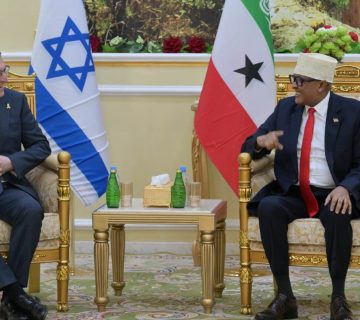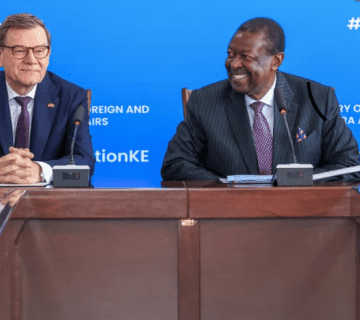Since Biden took office in January 2021, his administration has involved itself in several issues and crises in the Horn of Africa, primarily in Ethiopia and Somalia, to varying degrees of success. In Ethiopia’s Tigray crisis, the Biden administration adopted a more muscular foreign policy approach than its predecessor in an effort to press for the protection of human rights. However, US actions thus far have had a fairly limited impact on the Ethiopian government’s conduct. As it considers more drastic measures, the Biden administration should beware the potential political blowback of further alienating Ethiopia. The US should also step back from its mediating role in the Grand Ethiopian Renaissance Dam (GERD) dispute and issue support for a resolution effort led by the African Union, a more impartial and legitimate mediator. In Somalia, US efforts alongside internal and international actors to pressure the president to reject a two-year term extension were successful. However, the Biden administration has limited the US’ ability to target al Shabab and failed to improve the status of security cooperation in Somalia which sharply deteriorated under the Trump administration.
Significant US Actions in the Horn of Africa
The primary focus of the Biden administration’s attention in the Horn of Africa is Ethiopia. In response to the human rights violations committed by the Ethiopian government during the ongoing crisis in Tigray alongside ethnic militias and Eritrean allies, the Biden administration has paused security assistance and some economic assistance to Ethiopia and imposed visa restrictions on certain officials. It has also engaged in more symbolic efforts, placing diplomatic pressure on Abiy, the Prime Minister of Ethiopia, via remarks from the US Secretary of State and the newly-appointed US Special Envoy to the Horn, with the Secretary of State going so far as to characterize Ethiopian activities in Tigray as “ethnic cleansing.” However, American pressure does not seem to have significantly impacted Abiy’s government regarding its conduct in Tigray. A key demand of the US, the removal of Eritrean troops from Tigray, has not been met. CNN reported in mid-May that Eritrean soldiers were still present in Tigray, where they were continuing to block humanitarian access and commit human rights violations. The Biden administration, according to Foreign Policy Magazine, is reportedly considering sanctions and targeting World Bank and IMF programs in Ethiopia to increase pressure on Abiy’s government.
Although overshadowed by the crisis in Tigray, the Biden administration is also working to resolve the dispute between Ethiopia, Egypt, and Sudan regarding the Grand Ethiopian Renaissance Dam (GERD), which Sudan and Egypt believe threatens their water supply. The Trump administration heavily favored Egypt and Sudan during negotiations because both countries were key elements of US efforts to push for an Arab-Israeli rapprochement, according to the BBC. The Biden administration has adopted a more neutral stance and has decoupled a previous pause in some US aid programs to Ethiopia from the GERD dispute. It also dispatched the Special Envoy to the Horn to Sudan, Egypt, and Ethiopia to reignite efforts to resolve the issue.
The Biden administration has not taken steps to restore US-Somalia security cooperation. The administration chose not to redeploy troops to Somalia after the Trump-ordered withdrawal. Further, Biden put a stop to Trump-era drone targeting policies in Somalia and now requires that all strikes in Somalia first obtain approval from the White House. This policy is intended as a temporary measure, according to the US Department of Defense, while the Biden administration develops its own drone targeting policies and procedures. Nevertheless, the lack of a sustained US troop presence and the reduced ability of commanders to target key al Shabab personnel and infrastructure is certainly a boon for the terrorist organization.
The Somalia election crisis elicited international condemnation and concern. The US under the Biden administration was no exception. When Somali President Mohamed Abdullahi Mohamed accepted a two-year term extension, the US condemned the move and threatened sanctions and visa restrictions if Mohamed did not change tack. Under intense pressure internally as well as from the US and international actors, Mohamed ultimately decided to reject the term extension and push for the indirect elections that were previously agreed upon by Somali stakeholders.
Policy Recommendations for the US in the Horn
Regarding Tigray, the US is correct in pausing security assistance and strongly condemning ongoing human rights violations. Imposing sanctions and working with international institutions to cut back on aid to Ethiopia does have a possibility of success. However, the US must be aware of the potential for ‘blowback’. For the Abiy administration, Tigray poses an existential threat. As such, US threats and actions may have little impact on his decision making process and would further alienate Ethiopia, pushing it towards US adversaries, especially China.
Although the Biden administration has stepped away from Trump’s favoritism in the GERD dispute, the US standing as a mediator for the dispute is irrevocably compromised. The US should shift primary responsibility for the resolution of the dispute to the African Union (AU), a more impartial and legitimate mediator. Supporting AU efforts to resolve the dispute holds better prospects for success than continuing the US-led effort.
Due to domestic political sensitivities surrounding the ‘forever wars’ and progressive Democrats’ aversion to drone strikes, a return to the pre-Trump security cooperation in Somalia is highly unlikely. However, the Biden administration should issue revised guidance regarding drone strikes as soon as possible. Drone strikes are certainly not a panacea, and frequently cause more harm than good when they result in civilian deaths. However, they are a critical element of counter insurgency efforts and provide the US with the ability to reach out and eliminate key Al Shabab personnel, equipment, and infrastructure that local Somali forces cannot.
Although the efforts against President Mohamed’s term extension were successful, the US should continue to keep pressure on Mohamed and other key stakeholders work in good faith to ensure the election actually takes place. Yet another electoral crisis would be hugely destabilizing.
Joseph Hartung is a Researcher at the HORN Institute.
Photo: President Joe Biden prepares to sign executive orders yesterday in the Oval Office (Photo Credit: Getty Images)
The contents of this article are copyright of © The HORN Institute 2022. All rights reserved. Any redistribution or reproduction of part or all of the contents in any form and for whatever reason is prohibited. You may use the content of this article for personal reasons, but acknowledge the website as the source of the material.



